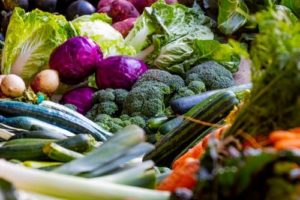
Nutrition for Pain Management
What you eat has a big impact on how you feel. Putting the right foods into your body can help to improve your levels of pain, your mood, your sleep, your digestion, your immune system and your energy levels. Food really can be medicine, and your diet should be an important part of your treatment plan.
Research has shown that an anti-inflammatory diet can be beneficial for people struggling with pain. Inflammation is a normal and healthy process that is part of our immune system to fight off illness. However, when the body becomes chronically inflamed this can contribute to various diseases and conditions.
You’ve probably heard of the Mediterranean diet – this is a great example of a diet which has been shown to lower inflammatory markers in the system. The Mediterranean Diet is recognised by the World Health Organization as a healthy and sustainable dietary pattern, which means that, unlike some other diets, it’s not a difficult one to follow and stick to.
What should you be eating?
Vegetables
Aim for at least 7 different vegetables a day. They contain antioxidants which support your immune system to fight inflammation. Try to include a variety of colours, and make sure you include green leafy vegetables like spinach, kale and lettuce, and cruciferous vegetables like broccoli, cabbage, sprouts and cauliflower which support the liver. Every time you make a meal think about how you can add more vegetables to it.
If you struggle to eat enough vegetables, print this chart from Dr Chatterjee’s website and stick it on your fridge, then try to eat one vegetable from each of the colours every day.
Fruit
Eat 2 or 3 different fruits per day. The ones that are particularly rich in antioxidants are berries, cherries and red grapes. Frozen fruit is just as good as fresh. Avoid fruit juices as they will give you a big sugar hit without the fibre that you get when you eat the whole fruit.
When it comes to vegetables and fruit, eat organic where possible. The Dirty Dozen and Clean 15 lists tell you which ones it’s particularly important to eat organic and which ones you can get away with eating non-organic.
Healthy Fats
The Mediterranean diet includes good healthy fats, including omega 3 fatty acids which reduce inflammation in the body. Fatty fish are a good source of omega 3s so include salmon, mackerel, anchovies, sardines, tuna steak and herring. Other sources are walnuts and ground flaxseed.
Monounsatured fat is another healthy fat you will want to include. Olive oil is a good source of this type of fat, as well as containing antioxidants to support your immune system, and also a compound called oleocanthal which has been shown to have anti-inflammatory and pain relieving effects similar to Ibuprofen. Use extra virgin olive oil as a salad dressing and for cooking.
Other healthy fats are found in coconut oil, rapeseed oil, avocado, olives, nuts and seeds. Avocados are great because they contain a good amount of fibre, monounsaturated fat and vitamin E which is an antioxidant.
Good quality protein
Another important aspect of a diet to help manage pain is the inclusion of good quality protein. Our nervous systems moderate pain, and this system of the body needs amino acids (the building blocks of protein) to function. Get your protein from fish, poultry, beans, eggs, tofu, gluten free oats, lentils, nuts and seeds.
Lentils and beans
Legumes (beans, peas and lentils) contain fibre, protein, folic acid and lots of important minerals such as magnesium, iron, zinc and potassium. Include them in soups, stews and salads.
Fibre
Fibre has been shown to lower C reactive protein, an inflammatory marker in the blood. It also keeps your digestive system moving regularly allowing for daily bowel movements, which are really important to avoid toxins being reabsorbed back into the bloodstream. We should be eating 30g of fibre a day. You can get this from vegetables, fruit, nuts and seeds. If you eat bread, pasta and noodles, switch to a whole grain version.
Turmeric, cinnamon and ginger
Turmeric contains curcumin which has been shown to relieve pain, as well as calm the digestive system. Cinnamon and ginger both have anti-inflammatory properties, and cinnamon also balances your blood sugar levels leading to more balanced energy.
How to add these to your diet: Add turmeric to stews and soups, sprinkle it over roasted vegetables (it’s particularly good on roasted cauliflower), mix with olive oil and apple cider vinegar for a salad dressing, and drink turmeric tea (Pukka do a good one). Sprinkle cinnamon over roasted sweet potato. Make a latte by warming almond or oat milk in a saucepan and adding ¼ teaspoon of cinnamon, turmeric and ginger.
Cherries
Tart cherry juice (with no added sugar) has been shown to help relieve pain particularly arthritic pain. Montmorency cherries also contain melatonin to help improve sleep.

Which nutrients are most important for managing pain?
There are certain nutrients that are particularly important in pain management. Many of these feature in the foods I’ve talked about, and some you might want to consider supplementing with a good quality supplement if you are tested and found to have a deficiency.*
Vitamin D
A deficiency can cause musculoskeletal pain and research has shown a particular link with vitamin D deficiency and back pain. Ask for your levels to be checked by your GP or have a test done privately – Thriva and Medichecks do an inexpensive finger prick test you carry out at home and post off to them. In the UK we don’t get enough sunlight to make vitamin D during the winter months so supplementing is a good idea for most people, and if your levels are very low you’ll need to take a higher dose.
Omega 3
Omega 3 and omega 6 fatty acids both have important functions in the body, but the balance is important. Ideally the ratio of omega 6 to omega 3 should be 4:1 or less, but many of us have a ratio between 10:1 and 50:1. High levels of omega 6 can be inflammatory whilst omega 3 fats are anti-inflammatory (as well as increasing our HDL (good cholesterol). As we know, inflammation in the body contributes to a number of chronic diseases so we want to keep our omega 3 levels up and our omega 6 levels down.
Rebalance your fatty acids ratio by cutting down on sunflower oil, soybean oil, processed foods, margarine and mayonnaise, and by eating oily fish twice a week, or consider supplementing with omega 3.
Magnesium
Magnesium has been shown to reduce neuropathic pain, muscle pain, headaches and migraines. It is also needed to convert vitamin D into its active form in the body. It can aid sleep, help to manage stress, and regulate the digestive system. Get magnesium in your diet through green leafy vegetables, nuts, seeds, legumes and whole grains. Relax in an Epsom salt bath, and also consider taking a supplement.
Vitamin C
A vitamin C deficiency can contribute to musculoskeletal pain. Make sure you’re eating enough vegetables and fruit to up your vitamin C levels. If you tend towards constipation, or your medication is making your bowels sluggish, upping your vitamin C intake can also help to get things moving – try 2 kiwis in the morning on an empty stomach.
B12
If your vitamin B12 levels are very low, the protective sheath that covers your nerves can become damaged causing nerve pain. Get your active B12 levels checked by your GP or do a finger prick test with Thriva or Medichecks (as before).
Antioxidants
Vitamins A, C and E, and selenium and zinc are all antioxidants which support your immune system and have been found to reduce pain. Get plenty of antioxidants in your diet by eating vegetables such as asparagus, beetroot, broccoli, carrots, kale, spinach, avocado, sweet potato, squash, cauliflower, and fruits such as berries, watermelon, peaches, apples, kiwi, orange, apricots, as well as brazil nuts, sunflower seeds, beans and poultry.
*Speak to a Registered Nutritional Therapist before starting any supplement programme
Written by Lesley Painter at Dandelion Nutrition and Health
Registered Nutritional Therapist and Colonic Hydrotherapist
www.dandelionnutritionandhealth.co.uk/



